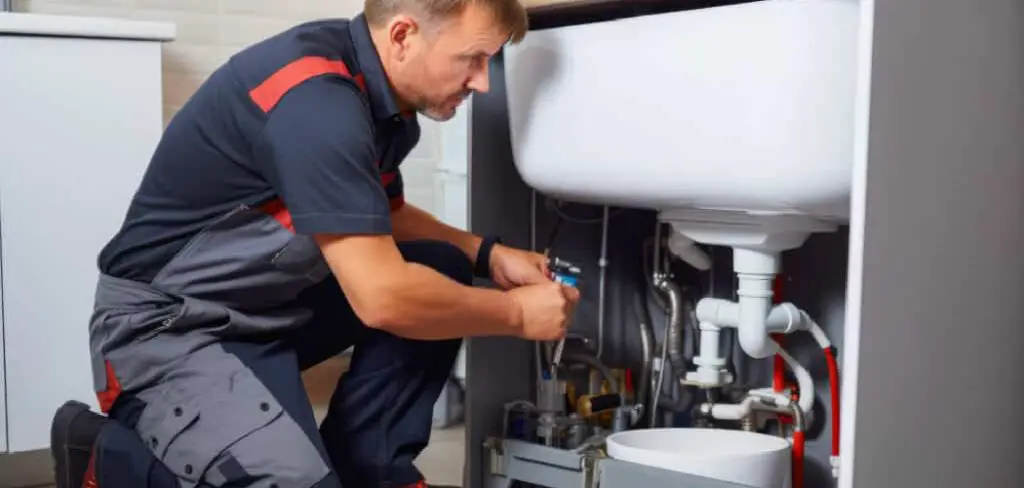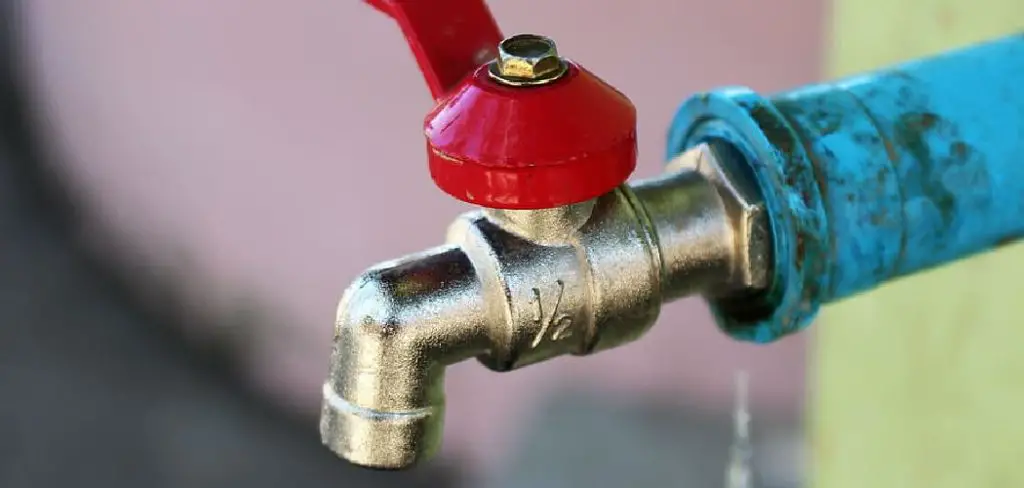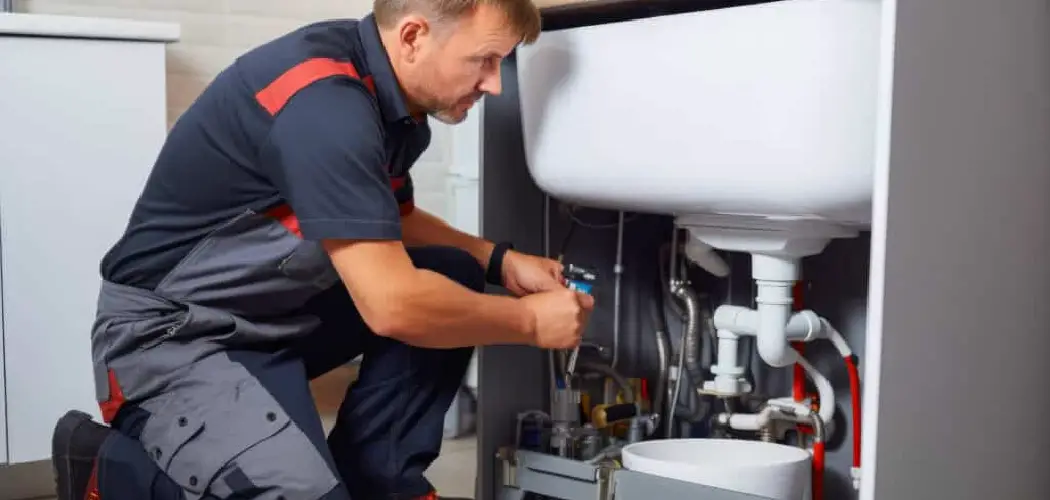Yes, pipe dope can be used on water lines to create a watertight seal and prevent leaks. When applied to the threads of the pipe fittings, pipe dope fills in any gaps or imperfections, ensuring a tight connection.
This can be especially useful in plumbing applications where water pressure is high or where the pipes are subjected to temperature fluctuations. By using pipe dope on water lines, you can enhance the reliability and longevity of your plumbing system, minimizing the risk of water damage and costly repairs.

Can Pipe Dope Seal Water Lines?
Can pipe dope seal water lines? When it comes to plumbing, ensuring a reliable and secure seal is crucial. Pipe dope, a compound commonly used for sealing joints, is often regarded as a go-to solution. In this blog post, we will explore the effectiveness of pipe dope when applied to water lines. We will delve into the understanding of pipe dope properties, its sealing effectiveness, and its compatibility with water lines.
Understanding Pipe Dope Properties
Before determining whether pipe dope can effectively seal water lines, it is important to understand its properties. Pipe dope, also known as thread sealant, is a paste-like substance made from a combination of lubricants, solvents, and fillers.
Though pipe dope comes in various compositions, it typically contains materials like Teflon, PTFE, or other polymers. These substances provide lubrication and help in filling gaps between joints, thus preventing leaks. Additionally, pipe dope can withstand high temperatures and pressures, making it suitable for various applications.
Sealing Effectiveness Of Pipe Dope
When it comes to sealing water lines, pipe dope has proven to be highly effective. Its composition allows it to create a secure seal that prevents leaks even under high pressure conditions. The paste-like consistency enables pipe dope to fill and seal small gaps, creating a tight bond between the joints.
Moreover, pipe dope has the ability to conform to the shape of the joint, ensuring a reliable seal. Unlike other sealants, pipe dope remains pliable after application, allowing for slight movement without compromising the seal. This flexibility ensures long-term effectiveness, minimizing the chances of future leaks.
Compatibility With Water Lines
Another critical aspect to consider is the compatibility of pipe dope with water lines. Fortunately, pipe dope is designed to work well with a variety of materials commonly used for plumbing, including steel, copper, and PVC. This versatility makes it suitable for sealing joints in different types of water lines.
It is important to note that pipe dope should be applied carefully to ensure it does not come into contact with the water being transported. This is especially crucial when working with potable water lines to prevent any contamination. Taking proper precautions and applying the pipe dope correctly will ensure its compatibility with water lines.
| Pros | Cons |
|---|---|
| Effective sealing properties | Application can be messy |
| Compatible with various materials | May not be suitable for all types of joints |
| Long-term reliability | Requires proper application to prevent contact with water |
In conclusion, pipe dope can indeed seal water lines effectively. Its unique properties, such as its ability to fill gaps, withstand high pressures, and conform to joint shapes, contribute to its sealing effectiveness. Moreover, its compatibility with a range of materials used in plumbing makes it a reliable choice for sealing joints in water lines. By utilizing pipe dope correctly and following best practices, you can ensure secure and leak-free plumbing connections.

Alternatives To Pipe Dope For Sealing Water Lines
Pipe dope may not be the best option for sealing water lines. Fortunately, there are alternatives available that can deliver better results in terms of durability and water tightness. These alternatives, such as Teflon tape or thread sealants, offer a reliable and long-lasting solution for sealing water lines.
When it comes to sealing water lines, pipe dope has long been the go-to solution for many plumbers and DIY enthusiasts. However, there are alternative options available that can be just as effective. In this article, we will explore three alternatives to pipe dope: Teflon tape, thread sealants, and pipe thread compounds.
Teflon Tape
Teflon tape, also known as plumber’s tape or thread seal tape, is a thin, flexible tape made of polytetrafluoroethylene (PTFE). It is specifically designed to create a watertight seal between threaded connections. Applying Teflon tape is a relatively simple process. Here’s how:
- Clean the threads of both male and female connections to remove any dirt or debris.
- Start at the end of the pipe and wrap the Teflon tape around the threads in a clockwise direction.
- Wrap the tape tightly, overlapping each layer by about half.
- Continue wrapping until you reach the end of the threads and cut off any excess tape.
- Tightly screw the connection together.
Thread Sealants
Thread sealants, commonly known as pipe sealants or pipe dope, are paste-like substances that are applied to the threads of water line connections. They help fill any gaps or voids between the threads, providing a secure and leak-free seal. Thread sealants are available in various formulas, including anaerobic and epoxy-based sealants. Here’s how to use thread sealants:
- Clean the threads of both male and female connections.
- Apply a thin, even layer of the thread sealant to the male threads. Be careful not to use too much, as excessive sealant can cause clogs or hinder the connection from fully tightening.
- Assemble the connection by screwing the male and female threads together.
- Allow the sealant to cure according to the manufacturer’s instructions before pressurizing the water line.
Pipe Thread Compounds
Pipe thread compounds, also known as pipe joint compounds or pipe dope, are another alternative to consider. They are typically thicker than thread sealants and contain lubricants that aid in tightening the connections while providing a reliable seal. Here’s how to use pipe thread compounds:
- Clean the threads of both male and female connections.
- Using a brush or a gloved finger, apply a thin, uniform layer of the pipe thread compound to the male threads.
- Assemble the connection by screwing the male and female threads together.
- Tighten the connection securely, but avoid over-tightening, as it can damage the threads.
Overall, when it comes to sealing water lines, there are several effective alternatives to pipe dope. Whether you choose Teflon tape, thread sealants, or pipe thread compounds, following proper application techniques will help ensure a secure and leak-free connection. Consider the specific requirements of your project and consult with a professional if needed. Now you’re equipped with the knowledge to make an informed decision about which method best suits your needs.
Frequently Asked Questions For Can Pipe Dope Be Used On Water Lines
What Is Pipe Dope And Can It Be Used On Water Lines?
Pipe dope is a sealing compound used to create a watertight seal between pipe threads. Yes, pipe dope can be used on water lines. It helps prevent leaks and provides lubrication for easy assembly and disassembly of fittings. However, it is important to use a lead-free pipe dope that is suitable for potable water applications.
How Does Pipe Dope Work On Water Lines?
Pipe dope works by filling the voids between the threads of pipes and fittings, creating a tight seal. It is designed to withstand high pressures and temperatures commonly found in water lines. The seal created by pipe dope prevents water leaks and ensures a reliable, long-lasting connection.
Is Pipe Dope Better Than Teflon Tape For Water Lines?
Both pipe dope and Teflon tape can be used to seal water lines effectively. However, pipe dope is generally considered to provide a more reliable and durable seal. It is better at filling gaps and irregularities between threads, ensuring a tight connection.
Teflon tape can be a quick and convenient option for small repairs or temporary connections.
Can Pipe Dope Be Used On Plastic Water Lines?
Pipe dope can be used on plastic water lines, but it is important to choose the right type of pipe dope that is compatible with the specific type of plastic. Some pipe dopes may contain chemicals that could degrade certain types of plastics.
Always check the product label and manufacturer’s recommendations before applying pipe dope to plastic water lines.
Conclusion
To sum it up, pipe dope can indeed be used on water lines to provide a secure and leak-free connection. Its sealing properties make it an effective solution for ensuring the longevity and functionality of water systems. However, it is crucial to choose the appropriate type of pipe dope specifically formulated for water applications.
By following the recommended application guidelines and using high-quality products, you can ensure the success of your water line projects. Remember, using pipe dope correctly is vital for the overall effectiveness and safety of your water systems.

